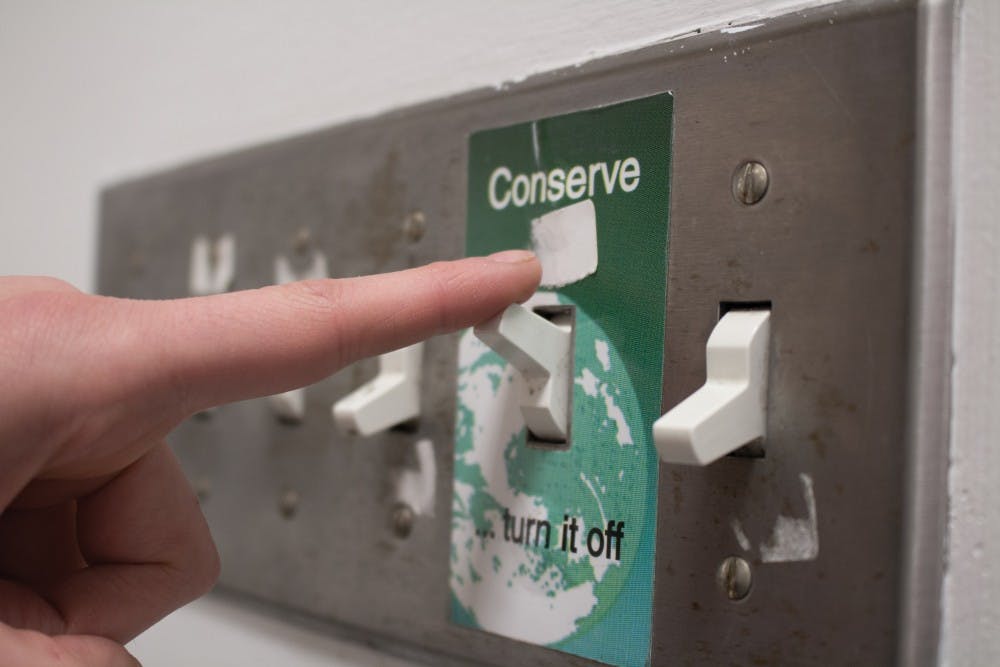
Funds saved from Penn's Green Campus Partnership's Energy Reduction Challenge power CURF sustainability research.
Credit: Sam Holland , Sam HollandTurn off your lights and unplug your phone — Penn’s campus-wide Energy Reduction Challenge starts Wednesday morning at 12 a.m. and will end 24 hours later.
And once again this year, it’s for a good cause — the cost of the energy saved will help fund research for Penn undergraduate students.
During the 2016 challenge, there was a 5.8 percent reduction in energy use, which translated to a donation of $5,800 from Facilities and Real Estate Services to fund sustainability research at the Center for Undergraduate Research.
The Energy Reduction Challenge is run by Penn’s Green Campus Partnership and is part of a month-long Power Down Challenge energy conservation campaign aimed at educating the Penn community.
“Part of our vision was [that] this challenge would be collaborative and philanthropic in nature,” Sustainability Outreach Manager Julian Goresko said. “We really felt it was important on this day to try to make a connection with the academic research at the University.”
Ann Vernon-Gray, Associate Director for Undergraduate Research at the Center for Undergraduate Research and Fellowships, spoke about the importance of the Power Down Challenge and its unique effect on undergraduate academic life.
“They have a number of concrete ways that they can contribute to energy savings, which then... help people make more targeted contributions in those areas,” Vernon-Gray said.
One of the winners of the grant in 2016 was College senior Lauren Brunsdale. She conducts research on the Ventura River Watershed, a dam in Ventura County, Ca.
Brunsdale used the grant to study land use, vegetation and beach replenishment as a result of the dam. She emphasized that there are thousands of similar dams around the country that hurt the environment; the problem is that they are incredibly expensive to remove.
“We have all these old dams and it is going to become increasingly more unstable,” Brunsdale said. “When you put a dam, that sediment that normally runs downstream would normally replenish the beach — you clog that, and the beaches erode away.”
Despite these issues, Brunsdale said she sees her research as an important step in making more environmentally conscious decisions.
“Hopefully, at the end of the day, it helps inform decision makers on the ground and how they are going to monitor the watershed.”
College junior Andro Mathewson was also awarded a grant as part of the 2016 Energy Reduction Challenge. Matthewson worked with Professor Simon Richter and other students to create a sustainability database.
“The basis of the project is to create an open source database of how sustainability is studied in every country around the world,” Matthewson said.
The database includes universities, government agencies, NGOs, activists, public policy experts and professors who are involved in environmental policy.
“A lot of the information can be used for public policy initiatives, for raising awareness about sustainability,” Matthewson said.
Matthewson emphasized the need of a stable political system in order to make sustainability and environmental awareness a feasible goal.
“Sadly, sustainability is always on the backburner [for governments]. It is one of those issues which is looking 200, 300 years ahead to the future. It is humanly impossible to plan that far ahead,” he said.
Despite this, the students and administrators believe Penn is taking productive steps to care for the environment through funding research and initiatives.
“Now more than ever, institutions, like universities, as well as cities across the United States at the local and municipal level, are going to be standing up and taking leadership around the issues of climate change and the environment,” Goresko said. “You can expect to see a lot from Penn and Philadelphia in that regard.”
The Daily Pennsylvanian is an independent, student-run newspaper. Please consider making a donation to support the coverage that shapes the University. Your generosity ensures a future of strong journalism at Penn.
Donate







